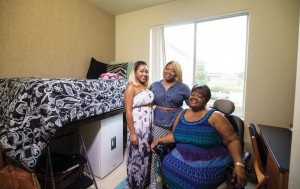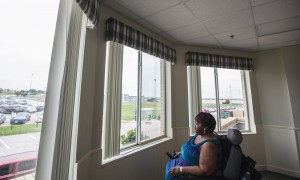Before becoming ill, Ray was “Supermom,” she said, a high-energy parent who tried be everything to everyone. Only a year into her college career in 1984, her husband, who served in the military, was transferred to Alaska, where the family lived until the couple divorced. Ray and her daughters moved back to Fort Worth.

“We had a very difficult transition after the divorce,” she said. “We just had to start over with basically nothing. I had a 6-month-old and a 4-year-old. Me and my mother-in-law would get together and go to thrift stores and buy clothes. Sometimes a utility could get cut off or something like that.”
Though she was raising two children on her own, she didn’t want Free or Whitley to be deprived of anything or feel the weight of the family’s limited resources. She provided an active, full life for her daughters. And despite feeling the strain of being the family’s sole breadwinner, she made time for all of the normal parenting rituals: attending swimming competitions and ballet lessons and sewing costumes for plays, band rehearsals, award ceremonies, and auditions for performances.
“I wanted to build character in my children, and I knew I couldn’t build character by letting the TV be their nanny,” she said. “So I had to put them in classes: cheer classes, dance classes, Tae Kwon Do, whatever. I was always looking for something to keep my children’s mind busy with the right thing.
“I didn’t have a lot of money to afford those classes,” she said. “So a lot of times, I would do things like I went to the dance studio, and I’d say, ‘Can I clean up around here? Can I do the floors, can I do the mirrors, and pay for my children’s tuition like that?’ ”
******
Ray uses a motorized wheelchair, affectionately nicknamed Hot Wheels, because her body is in so much pain and her muscles so weak. She undergoes several daily treatments, and she takes a baker’s rack of pills to suppress her immune system and reduce inflammation. Living with a compromised immune system poses its own challenges. Being exposed to certain viruses like the flu could kill her.

When the symptoms first started, Ray thought she was just feeling the brunt of being an overworked single mother. She began to take over-the-counter painkillers every day, and her energy level slowly, steadily declined.
One day she almost fainted while walking from her car to her office. Her doctor insisted she go to the emergency room, and that led to an eight-month search to find out what was wrong with her. She was constantly in doctors’ offices, undergoing tests and giving blood. She was initially diagnosed with pneumonia, but that didn’t explain why she broke out in rashes on her chest and face or why lesions formed all over her body.
“It was a shock to my life,” she said. “I was very active. I was a single mother and had a full-time job that was very demanding. I was already burning the candle at both ends. It was like hitting a concrete pillar.”
The disease causes the immune system to attack skin, muscles, connective tissue, and vital organs. Only nine out of 1 million people are diagnosed with the disease. There is no cure for dermatomyositis, and it’s a particularly aggressive disease. Though some people can live up to 20 years with it, most die in the first two. Ray’s prognosis was grim.
Free was a junior in high school when doctors said her mother probably wouldn’t live to see her graduate high school. Free also found out that she had power of attorney on her mother’s behalf.
“I had no idea what that was,” she said. “She’s always been Mom. I knew she was sick, but I didn’t know it was that serious.”
As Ray went through various treatments, Free was forced to put a part of her childhood on hold to take care of her younger sister.
“I was making lunches and taking her to school, doing all of the stuff that Mom had done forever,” she said. “I learned how to be a mom. I had to step up and help.”
Free was too busy to be sad, she said, and didn’t want to burden her mother with her problems.
“I didn’t feel any emotions, just because I didn’t want to be one more person she had to worry about,” she said. “She raised me to be a strong, independent woman. So I knew that I had it in me if something happened to her. But that was so far removed from my thoughts.”
Since Ray started feeling better, Free has gotten to relinquish adulthood and recapture some of her lost youth.
“I’ve had the most amazing college experience that I think anyone has had,” she said. “In high school, my mom got sick, so that made me grow up. In college, I was able to be myself. People accepted me, and it’s been amazing.”












This is an uplifting story! Thanks!